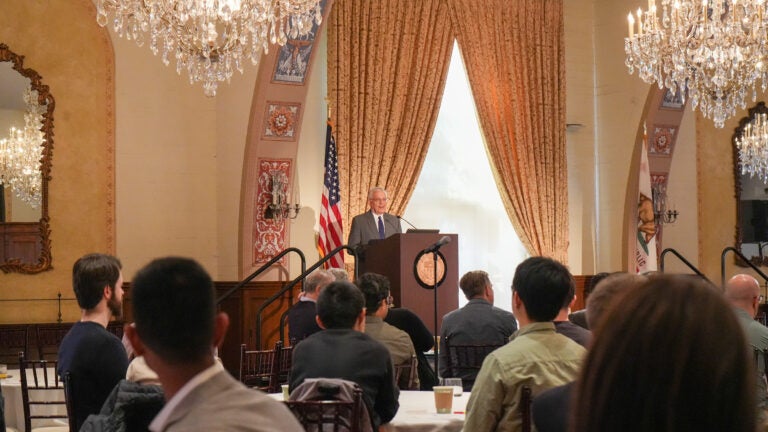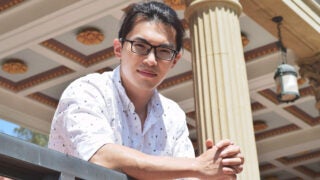
Dean Yannis Yortsos of the USC Viterbi School of Engineering speaks at the Quantum Technologies Forum. (Photo/Dani Orlando)
Quantum Technologies Forum navigates present and future of quantum at USC
The forum introduced the university’s vision on how to continue its growth in the field of quantum by focusing on promising research areas and more.
USC’s quantum computing research is gaining momentum, with a string of recent milestones that began last year when USC President Carol Folt launched the university’s Frontiers of Computing “moonshot.”
The ambitious $1 billion-plus, 10-year initiative is spurring a new approach to computer science-based research and education at USC, with a greater focus on aspects such as quantum and artificial intelligence, as well as data science, blockchain and machine learning.
Under Frontiers of Computing, USC unites its multiple strengths in computer science and advanced computing, data analytics, imaging, telemedicine and the creative economy. The initiative includes the new USC School of Advanced Computing that is the nexus and incubator for advanced computation projects for students and faculty.
For its latest milestone in the expansion of Frontiers of Computing, the university last week hosted its first Quantum Technologies Forum. The event drew 160 experts both from industry and across the university to discuss the trajectory of the technology that now scaffolds research and computation across multiple sciences, from physics to chemistry and biology.
USC’s effort on quantum began at the university more than two decades ago. Yannis C. Yortsos, dean of the USC Viterbi School of Engineering, noted how in that time the university became the first in the world to have a quantum computer — a D-Wave computer — on site. “It’s very rewarding to see the growth of quantum computing and all the different ways it is evolving on campus,” Yortsos said.
Quantum research has grown over time, thanks to the government and industry investment. Since 2019, the federal government’s investment in quantum technologies has nearly doubled, from $449 million in fiscal year 2019 to $932 million in 2023, according to McKinsey. Industry leaders, such as Cisco and Google, have expanded the footprint of quantum research in Silicon Beach, Los Angeles County’s growing tech corridor.
Moh El-Naggar, interim dean of the USC Dornsife College of Letters, Arts and Sciences, noted that USC has more than 25 research groups working in the quantum information sciences, many of which focus on the central challenge of quantum error correction. That’s a fundamental process in quantum computing and quantum information theory that addresses the problem of errors occurring due to decoherence and other quantum noise.
The university plans to expand its efforts by hiring even more faculty and accelerating the development and sustainability of quantum computing.
“We would like to now build on this position, put together an experimental program in this area, and partner with academia, industry and government to continue to move the needle on quantum error correction,” El-Naggar said.
A milestone year
USC investment into computing and quantum research has realized numerous breakthroughs this year. In February, USC began operations as an IBM Quantum Innovation Center, a collaboration that gives the university’s researchers cloud access to IBM quantum systems, helping prepare students to join a rapidly growing quantum workforce.
In May, the university renewed its multiyear partnership with D-Wave to continue to house a state-of-the-art D-Wave Advantage quantum computer at the USC Information Sciences Institute in Marina del Rey. The USC Viterbi center will continue to use the D-Wave with the goal of leading ongoing exploration and adoption of annealing quantum computing solutions.
“Our quantum system at USC plays an important role in supporting the university’s efforts to serve as an epicenter of quantum research and education,” said Lorenzo Martinelli, chief revenue officer at D-Wave said in a news release about the initiative.
“Our 5,000-plus-qubit quantum computer — currently the world’s largest quantum computer — gives enterprise users, researchers and public sector organizations incredibly powerful computational capabilities for solving complex problems, and we look forward to continuing our collaboration with USC to advance scientific progress and business transformation,” Martinelli said.
Last month, the university opened the Dr. Allen and Charlotte Ginsburg Human-Centered Computation Hall. The 116,000-square-foot, seven-story building is the home of the new School of Advanced Computing, led by Director Gaurav Sukhatme.
Quantum comes into focus
The forum was an opportunity to educate the attendees about three focus areas within the USC Quantum Initiative that are critical for the growth, advancement and sustainability of computing: quantum error correction, quantum-enabled applications and universal quantum sensing.
Daniel Lidar, the director of the USC Center for Quantum Information Science and Technology, said that the quantum computing field faces significant hurdles in hardware and software development. The computers are highly sensitive and vulnerable to unintentional interactions with their environments. “To this end, one of my main areas of research is developing effective methods of suppressing and correcting quantum errors,” Lidar said.
Quantum-enabled applications can help scientists in multiple fields address longstanding problems in their respective fields as many of them now involve complex computations with large sets of data.
“Quantitative-enabled approaches are increasingly decisive to solve biological problems,” said Rosa Di Felice, professor of physics and astronomy and quantitative and computational biology at USC Dornsife, at the forum. In computational biology, quantum computing can leverage the unique properties of quantum mechanics — such as superposition, entanglement and quantum tunneling — to solve complex biological problems more efficiently than classical computing.
Quntao Zhuang, an assistant professor of electrical and computer engineering and physics and astronomy at USC Viterbi, spoke on universal quantum sensing, which is a method or system that leverages quantum properties to detect various types of physical phenomena with high precision. “A recent focus in universal quantum sensing is enhancing the search for dark matter,” Zhuang said.
Quantum computing usage
“Quantum computing doesn’t create value in isolation,” said Florenta Teodoridis, associate professor of management and organization at the USC Marshall School of Business. “Instead, its impact develops through feedback loops between development and adoption, where each breakthrough fuels further innovation, sparking new cycles of progress and value creation.”
One of the goals of the meeting was to increase collaboration and partnerships between academia, industry, and government, working in quantum technologies in the Southern California region. To close the day, a panel discussion titled “Building the quantum ecosystem in Southern California” moderated by Tim Graves of The Aerospace Corp. brought together several experts in quantum information science and technology: Lidar; Reza Nejabati, head of quantum research at Cisco; Sergio Boixo, senior staff research scientist at Google; Mark Gyure, executive director of the UCLA Center for Quantum Science and Engineering; and Jason Hyon of NASA’s Jet Propulsion Laboratory.
The forum ended with a bustling session of over 25 posters presented by USC graduate students, including students from the program in quantum information systems, a vibrant community with alumni who have gone on to work at tech leaders such as Amazon, Google and IBM.
“Our ability to do cutting-edge research in the area of quantum computing and to train researchers continues to grow in direct proportion to USC’s long-term commitment and robust investment in the area,” Lidar said.



